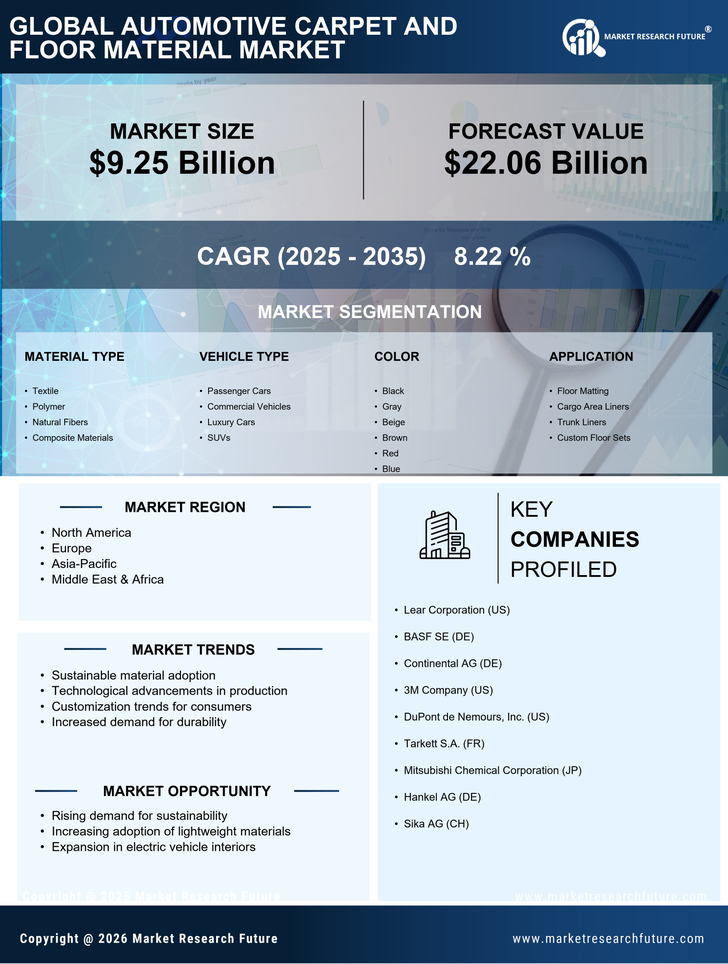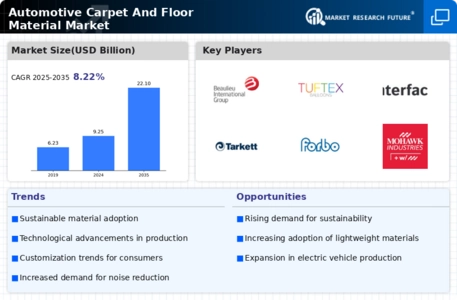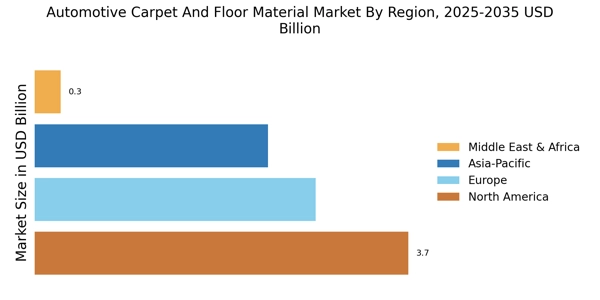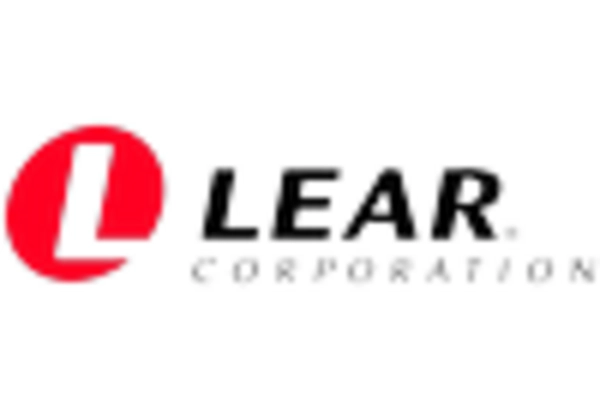Customization Trends
Customization trends are reshaping the Automotive Carpet And Floor Material Market, as consumers increasingly seek personalized vehicle interiors. This demand for tailored solutions is driving manufacturers to offer a variety of materials, colors, and textures. Recent surveys indicate that nearly 60% of consumers are willing to pay a premium for customized features in their vehicles. This trend is particularly pronounced among younger demographics, who prioritize individuality and self-expression. As a result, companies are investing in advanced manufacturing techniques, such as 3D printing, to facilitate bespoke designs. The ability to offer unique carpet and floor material options not only enhances customer satisfaction but also positions brands as leaders in innovation, potentially increasing market share in a competitive landscape.
Regulatory Compliance
Regulatory compliance is a significant driver in the Automotive Carpet And Floor Material Market. As governments worldwide implement stricter regulations regarding vehicle emissions and safety standards, manufacturers are compelled to adapt their materials accordingly. Compliance with these regulations often necessitates the use of specific materials that meet safety and environmental criteria. For instance, the introduction of regulations aimed at reducing volatile organic compounds (VOCs) in automotive interiors is pushing manufacturers to explore alternative materials. This shift not only ensures compliance but also enhances the overall quality of automotive carpets and floor materials. The need for regulatory adherence is likely to drive innovation, as companies invest in research to develop compliant yet high-performance materials, thereby positioning themselves favorably in a competitive market.
Sustainability Initiatives
The Automotive Carpet And Floor Material Market is increasingly influenced by sustainability initiatives. Manufacturers are adopting eco-friendly materials, such as recycled plastics and natural fibers, to meet consumer demand for greener products. This shift is not merely a trend; it reflects a broader commitment to reducing environmental impact. According to recent data, the use of recycled materials in automotive interiors is projected to grow by 15% annually, indicating a strong market response to sustainability. As regulations tighten around emissions and waste, companies that prioritize sustainable practices are likely to gain a competitive edge. This focus on sustainability not only appeals to environmentally conscious consumers but also aligns with corporate social responsibility goals, thereby enhancing brand loyalty and market share.
Technological Advancements
Technological advancements are playing a crucial role in shaping the Automotive Carpet And Floor Material Market. Innovations in material science are leading to the development of carpets that are not only more durable but also lighter and easier to clean. For example, advancements in fiber technology have resulted in carpets that resist stains and wear, thereby extending their lifespan. Furthermore, the integration of smart technologies, such as sensors and heating elements, is becoming more prevalent in automotive interiors. These developments are expected to drive market growth, as consumers increasingly seek high-performance materials that enhance comfort and convenience. The ongoing research and development in this field suggest a promising future for the industry, with potential for new product lines that cater to tech-savvy consumers.
Impact of Electric Vehicles
The rise of electric vehicles (EVs) is significantly impacting the Automotive Carpet And Floor Material Market. As EV adoption accelerates, manufacturers are adapting their product offerings to meet the specific needs of this segment. For instance, the interior design of electric vehicles often emphasizes lightweight materials to enhance efficiency and range. Data suggests that the demand for lightweight automotive carpets is expected to increase by 20% over the next five years, driven by the need for energy efficiency in EVs. Additionally, the unique requirements of EV interiors, such as noise reduction and thermal insulation, are prompting innovations in carpet and floor material technologies. This shift not only presents opportunities for growth but also challenges manufacturers to stay ahead of evolving consumer preferences.


















